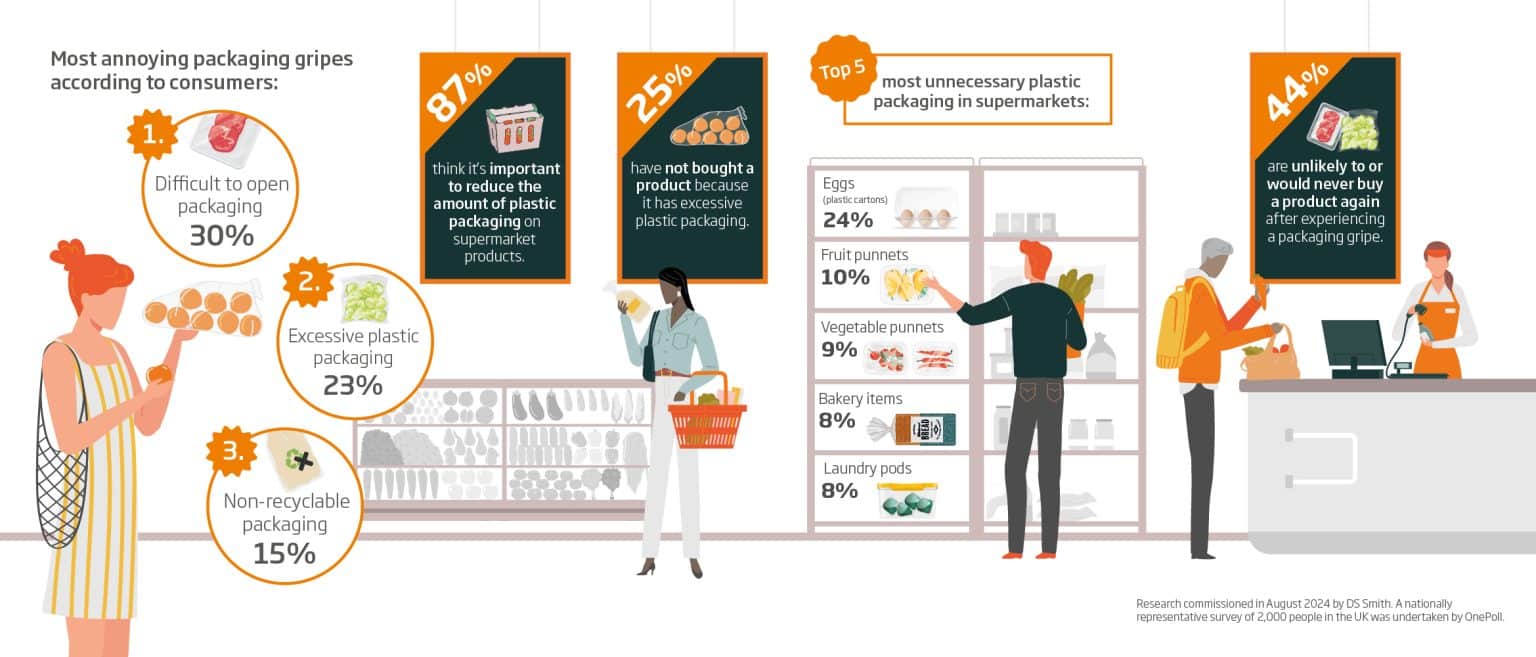New research has uncovered the extent of British shoppers’ frustration with supermarket packaging, revealing a widespread dislike for excessive plastic and non-recyclable materials. The survey, commissioned by sustainable packaging firm DS Smith, highlights growing consumer discontent and a willingness to pay more for eco-friendly alternatives.
According to the study, nearly a third of shoppers (30%) are particularly irritated by the excessive use of plastic in packaging fruit and vegetables. This frustration is strong enough to influence purchasing decisions, with one in four respondents (25%) admitting they have avoided buying a product simply because it was overly wrapped in plastic. A further 28% expressed annoyance with packaging that cannot be recycled, reflecting the increasing importance of sustainability in consumer choices.
Other common irritations include products being encased in unnecessary layers of packaging, items that require scissors to open, and so-called ‘easy peel’ corners that often prove anything but. Such packaging frustrations have significant consequences, with 44% of respondents saying they are less likely, or even never likely, to repurchase a product with annoying or excessive packaging.
Unclear recycling instructions also emerged as a significant issue, with one in five respondents (21%) encountering confusing messaging on packaging. When faced with unclear recycling information, a third of consumers admitted they would simply dispose of the item in general waste, while 32% would guess and place it in the recycling bin, potentially contaminating recyclable materials.
Excessive plastic use is a particular bugbear for many, with nearly a quarter of respondents saying it is their biggest packaging-related pet peeve. On average, shoppers encounter such annoyances twice a week, with half of them feeling guilty when faced with excessively packaged products.
A spokesperson for DS Smith commented on the findings, saying, “Packaging is essential to protect products, but it’s clear that excessive plastic and non-recyclable materials are major concerns for consumers. These issues can often be addressed at the design stage, with paper-based materials offering a more readily recyclable alternative.”
The survey also revealed that 38% of consumers are concerned about the amount of plastic in packaging when making supermarket purchases, ranking this issue as more important than the product’s origin or its overall recyclability. When it comes to fruit packaging, 17% of shoppers said they would prefer to use paper bags, while only 5% are comfortable with plastic punnets.
The research also highlights a significant consumer willingness to pay more for sustainable packaging. Nearly a quarter of respondents (24%) said they would be willing to pay up to 33p extra for a product if it were packaged in an eco-friendlier manner. However, 22% of shoppers believe that recycling instructions on supermarket packaging remain unclear, underscoring the need for more straightforward messaging.
This study comes as DS Smith celebrates a key milestone in its sustainability journey, having replaced over 1.2 billion pieces of plastic 16 months ahead of its 2025 target. The company has focused on removing everyday plastic items from supermarket shelves, such as fruit and vegetable punnets, plastic carriers, and shrink-wrap commonly found on soft drink bottles.
Demand for plastic replacement continues to grow, with DS Smith nearly doubling the annual number of plastic pieces replaced since the target was set in 2020. The spokesperson added, “A lot has changed in the last few years, with significantly less plastic in supermarkets today. However, there is still plenty of opportunity for brands to further reduce and replace plastic in their packaging.”
The survey’s findings clearly indicate that while progress has been made, British consumers remain eager for more sustainable packaging solutions, and businesses must continue to innovate to meet this demand.




